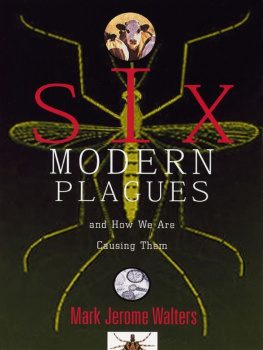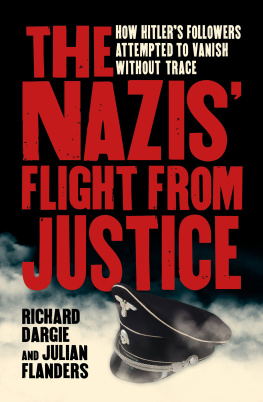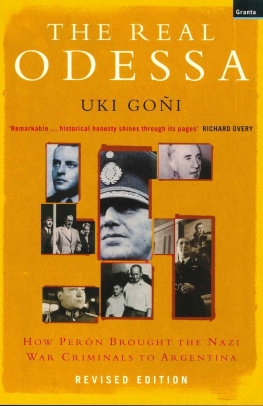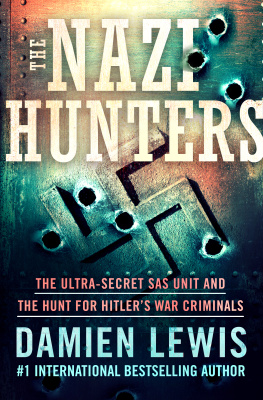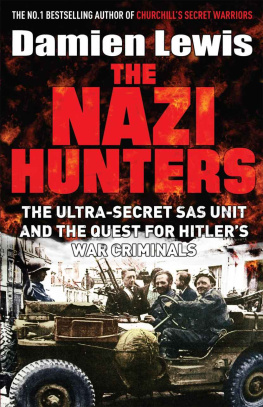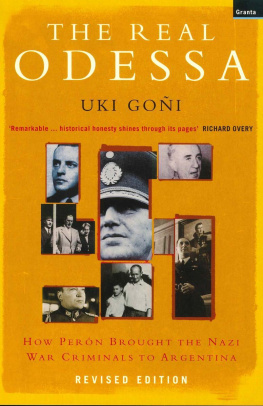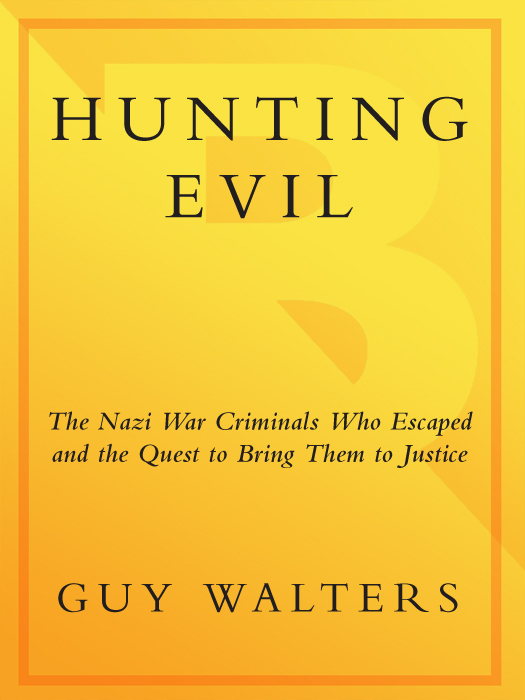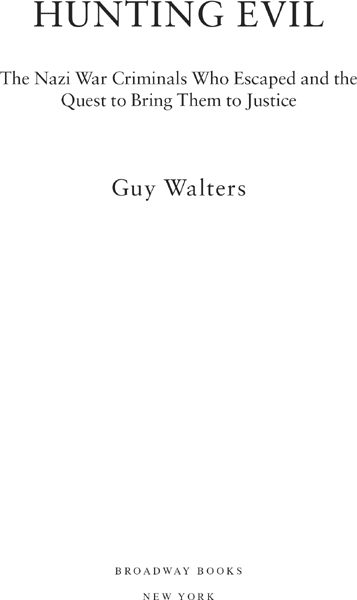Also by Guy Walters
Fiction
The Traitor
The Leader
The Occupation
The Colditz Legacy
History
The Voice of War (edited with James Owen)
Berlin Games
For more information on Guy Walters and his books,
visit his website at www.guywalters.com
This book is for my brother,
DOMINIC WALTERS
Mundus vult decipi
Petronius
Contents
12
Preface
IF BOOKS turned out exactly the way in which authors expected, writing would be an unsatisfying process indeed. When I started this project three years ago, my knowledge of the subject matter was conventional: the Nazis escaped with the help of a network called Odessa, they ended up living in vast estancias in Latin American jungles, and were stalked by fearless and redoubtable Nazi hunters such as Simon Wiesenthal. The subject was clearly engaging and the huge interest shown in my book proposal confirmed my belief that the topic required an account that was both compelling and historically rigorous. It was only when I started my in-depth research that I realized that so much of what I held to be true was simply not so. For a while, I wanted to change the title to Hunting Evil (Or Not), but I never dared suggest it to my editor for fear that he would think I had sold him a pup. Although much of what I have learned contradicts what I knew, there is no doubt that the book is the better for it, and the constant process of discovery has maintained my excitement over what has been a long haul, both temporally and topographically.
As is so common, I have found the truth to be far more satisfying than what has been served up by junk historians in print and online. I have also found the truth to be utterly scandalous, and on numerous occasions I have felt genuine anger at what I have discovered. I make no apology for the occasions at which that emotion shines through, because it was certainly new to me that the British employed a senior officer in one of the Einsatzgruppen as an MI6 agent. It was also disturbing to discover that Simon Wiesenthal, for so long held to be some sort of secular saint, fabricated not only his role in the Eichmann hunt, but also countless other episodes in his life. I was also annoyed by the lack of political will for hunting Nazi criminals, many of whom could have easily been brought to justice had governments allocated even comparatively meager resources to their pursuit. Some might suggest that as well as being angry I sometimes display retrospective wisdom, but once again, I make no apology. I certainly do my best to place any decisions made within their context, but where I judge those decisions to have been incorrect, I do not shy from condemnation. One of the privileges of writing historyand surely one of its purposesis to make such judgments. Of course, the conclusions I reach are open to question and scrutiny, but I believe they are the correct ones based on the evidence available to me. I positively encourage correspondence, and interested readers can contribute their thoughts to the forum pages on huntingevil.com, which also contains various features such as animated maps and films that are intended to complement these printed pages.
Unlike a website, a book does not of course have an almost endless capacity, and I have had to be ruthless in my selection of material. With potentially tens of thousands of escapees to write about, it would have been impossible to capture the whole story of how the Nazis fled and how they were tracked down (or not). Instead, I have presented the stories of a handful of criminals whose experiences are representative of the many. That these individualswho include Josef Mengele, Adolf Eichmann, Franz Stanglare well known will I hope serve to increase the readability of what follows. The other group of characters includes the hunters, and here I had a much easier time when it came to casting. The figure of Simon Wiesenthal was unavoidable, and it is he upon whom much of my focus is trained. Some may feel that I have been overly harsh on the man, and that I have run a professional danger in seemingly allying myself with a vile host of neo-Nazis, Revisionists, Holocaust deniers, anti-Semites, and other such nasty cranks. I should stress that I belong firmly outside any of these squalid camps, and it is my intention to wrestle criticism of Wiesenthal away from their clutches. In addition to the hunters and hunted, I also write about the helpers, who include figures such as Juan Pern and Catholic priests such as Alois Hudal and Krunoslav Draganovi. Thousands of people helped Nazis escape, but, once again, I have had to ration myself. I have nevertheless allowed myself the luxury of recounting the comic story of the British fascist and quondam camel specialist Arnold Leese, which would surely make the stuff of a comic film or play. My final group of characters is that of the hired: those criminals whom the Allies, including the Soviet Union, exploited as intelligence assets. Shockingly, there were many for me to choose from, and although the story of Barbie can stand on its own, I felt it important to enrich this aspect by revealing a host of other criminals who were used. I am more forgiving than some of the use of such criminals, and I have restrained myself from making naive and simplistic moral judgments, but at times it has been hard not to bang my head against the screen out of sheer frustration at the cynicism displayed by those who employed mass murderers.
I am aware that some may be disappointed at what I have omitted. Readers with more legalistic minds than mine might wish for more material on topics such as due process, statutes of limitations, legislation, and trials, but I have reckoned them to be outside my remit. I have also shied away from writing about more recent cases, which, although important, involve figures who are seemingly insignificant compared to those such as Eichmann. Some of these casesespecially that of John Demjanjukare also ongoing, and I felt it prudent not to dwell on subjects that have not yet been resolved. Although I regret these omissions, I am not sorry to let down the lovers of conspiracy theory. There have been too many books about this topic that make the most outrageous claimsespecially about Odessa and the direct involvement of Pius XII in engineering escapesand I have refrained from entertaining such claims. My rule of thumb in preparing this book was that every fact I included had to be defendable in a court of law, which was a frustratingly high, but necessary, standard to maintain. However, conspiracy theorists are not so rigorous, and as a result are able to present material that is sensational and back it up with little more than a knowing tap against the nose. Conspiracy theorists rely on an absence of documentation to prove their cases, whereas I feel that the duty of the conscientious historian is to draw only on solid evidence. Naturally, I have included conjecture of my own, but this is clearly flagged as such, despite there being an enormous temptation to claim truthfulness in the interests of commercialism. Even without the more outlandish theories, there is more than enough within these pages to make the general reader as surprised as I was when I discovered the true nature of Nazi hunting and its personalities.
Some may be deterred by the vast quantity of footnotes, but I suggest that these need be consulted only by the more academic reader. Those who peruse them will notice that I am particularly indebted to a number of other researchers and writers, and I fully acknowledge the excellent work ofin alphabetical orderTom Bower, David Cesarani, Uki Goi, Ernst Klee, Holger M. Meding, Gerald L. Posner and John Ware, Matteo Sanfilippo, Heinz Schneppen, Matthias Schrder, Gitta Sereny, and Gerald Steinacher. At times I diverge from the conclusions they reach, but all of their works are invaluable for anybody who wishes to dig further. This book, however, is far from being a mere synthesis of secondary sources, and I am also grateful to the staffs of the archives I have used in the United Kingdom and the United States.



